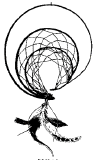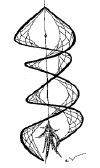The Soul of the Indian
Eastman, Charles Alexander (1911)

I. THE GREAT MYSTERY
THE original attitude of the American Indian toward the
Eternal, the "Great Mystery" that surrounds and embraces us, was as simple
as it was exalted. To him it was the supreme conception, bringing with it
the fullest measure of joy and satisfaction possible in this life.
The worship of the "Great Mystery" was silent, solitary,
free from all self-seeking. It was silent, because all speech is of
necessity feeble and imperfect; therefore the souls of my ancestors ascended
to God in wordless adoration. It was solitary, because they believed that He
is nearer to us in solitude, and there were no priests authorized to come
between a man and his Maker. None might exhort or confess or in any way
meddle with the religious experience of another. Among us all men were
created sons of God and stood erect, as conscious of their divinity. Our
faith might not be formulated in creeds, nor forced upon any who were
unwilling to receive it; hence there was no preaching, proselyting, nor
persecution, neither were there any scoffers or atheists.
There were no temples or shrines among us save those of
nature. Being a natural man, the Indian was intensely poetical. He would
deem it sacrilege to build a house for Him who may be met face to face in
the mysterious, shadowy aisles of the primeval forest, or on the sunlit
bosom of virgin prairies, upon dizzy spires and pinnacles of naked rock, and
yonder in the jeweled vault of the night sky! He who enrobes Himself in
filmy veils of cloud, there on the rim of the visible world where our
Great-Grandfather Sun kindles his evening camp-fire, He who rides upon the
rigorous wind of the north, or breathes forth His spirit upon aromatic
southern airs, whose war-canoe is launched upon majestic rivers and inland
seas -- He needs no lesser cathedral!
That solitary communion with the Unseen which was the
highest expression of our religious life is partly described in the word
bambeday, literally "mysterious feeling," which has been variously
translated "fasting" and "dreaming." It may better be interpreted as
"consciousness of the divine."
The first bambeday, or religious retreat, marked an epoch
in the life of the youth, which may be compared to that of confirmation or
conversion in Christian experience. Having first prepared himself by means
of the purifying vapor-bath, and cast off as far as possible all human
fleshly influences, the young man sought out the noblest height, the most
commanding summit in all the surrounding region. Knowing that God sets no
value upon material things, he took with him no offerings or sacrifices
other than symbolic objects, such as paints and tobacco. Wishing to appear
before Him in all humility, he wore no clothing save his moccasins and
breech-clout. At the solemn hour of sunrise or sunset took up his position,
overlooking the glories of earth and facing the "Great Mystery," and there
he remained, naked, erect, silent, and motionless, exposed to the elements
and forces of His arming, for a night and a day to two days and nights, but
rarely longer. Sometimes he would chant a hymn without words, or offer the
ceremonial "filled pipe." In this holy trance or ecstasy the Indian mystic
found his highest happiness and the motive power of his existence.
When he returned to the camp, he must remain at a distance
until he had again entered the vapor-bath and prepared himself for
intercourse with his fellows. Of the vision or sign vouchsafed to him he did
not speak, unless it had included some commission which must be publicly
fulfilled. Sometimes an old man, standing upon the brink of eternity, might
reveal to a chosen few the oracle of his long-past youth.
The native American has been generally despised by his
white conquerors for his poverty and simplicity. They forget, perhaps, that
his religion forbade the accumulation of wealth and the enjoyment of luxury.
To him, as to other single-minded men in every age and race, from Diogenes
to the brothers of SaintFrancis, from the Montanists to the Shakers, the
love of possessions has appeared a snare, and the burdens of a complex
society a source of needless peril and temptation. Furthermore, it was the
rule of his life to share the fruits of his skill and success his less
fortunate brothers. Thus he kept his spirit free from the clog of pride,
cupidity, or envy, and carried out, as he believed, the divine decree -- a
matter profoundly important to him.
It was not, then, wholly from ignorance or improvidence
that he failed to establish permanent towns and to develop a material
civilization. To the untutored sage, the concentration of population was the
prolific mother of all evils, moral no less than physical. He argued that
food is good, while surfeit kills; that love is good, but lust destroys; and
not less dreaded than the pestilence following upon crowded and unsanitary
dwellings was the loss of spiritual power inseparable from too close contact
with one's fellow-men. All who have lived much out of doors know that there
is a magnetic and nervous force that accumulates in solitude and that is
quickly dissipated life in a crowd; and even his enemies have recognized the
fact that for a certain innate power and self-poise, wholly independent of
circumstances, the American Indian is unsurpassed among men.
The red man divided mind into two parts, -- the spiritual
mind and the physical mind. The first is pure spirit, concerned only with
the essence of things, and it was this he sought to strengthen by spiritual
prayer, during which the body is subdued by fasting and hardship. In this
type of prayer there was no beseeching favor or help. All matters of
personal or selfish concern, as success in hunting or warfare, relief from
sickness, or the sparing of a beloved life, were definitely relegated to the
plane of the lower or material mind, and all ceremonies, charms, or
incantations designed to secure a benefit or to avert a danger, were
recognized as emanating from the physical self
The rites of this physical worship, again, were wholly
symbolic, and the Indian no more worshiped the Sun than the Christian adores
the Cross. The Sun and the Earth, by an obvious parable, holding scarcely
more of poetic metaphor than of scientific truth, were in his view the
parents of all organic life. From the Sun, as the universal father, proceeds
the quickening principle in nature, and in the patient and fruitful womb of
our mother, the Earth, are hidden embryos of plants and men. Therefore our
reverence and love for them was really an imaginative extension of our love
for our immediate parents, and with this sentiment of filial piety was
joined a willingness to appeal to them, as to a father, for such good gifts
as we may desire. This is the material or physical prayer.
The elements and majestic forces in nature, Lightning,
Wind, Water, Fire, and Frost, were regarded with awe as spiritual powers,
but always secondary and intermediate in character. We believed that the
spirit pervades all creation and that every creature possesses a soul in
some degree, though not necessarily a soul conscious of itself. The tree,
the waterfall, the grizzly bear, each is an embodied Force, and as such an
object of reverence.
THE GREAT MYSTERY -
2
THE FAMILY ALTAR -
2
CEREMONIAL AND SYMBOLIC WORSHIP
-
2
BARBARISM AND THE MORAL CODE
-
2
UNWRITTEN SCRIPTURES
-
2
ON THE BORDERLAND OF SPIRITS
-
2
White Eagle Soaring: Dream Dancer of the 7th Fire







 Get
a course to promote your business online, explode your sales
Get
a course to promote your business online, explode your sales Get
software to promote your business online in less time
Get
software to promote your business online in less time Get
software to streamline your business and run it hands free.
Get
software to streamline your business and run it hands free.
